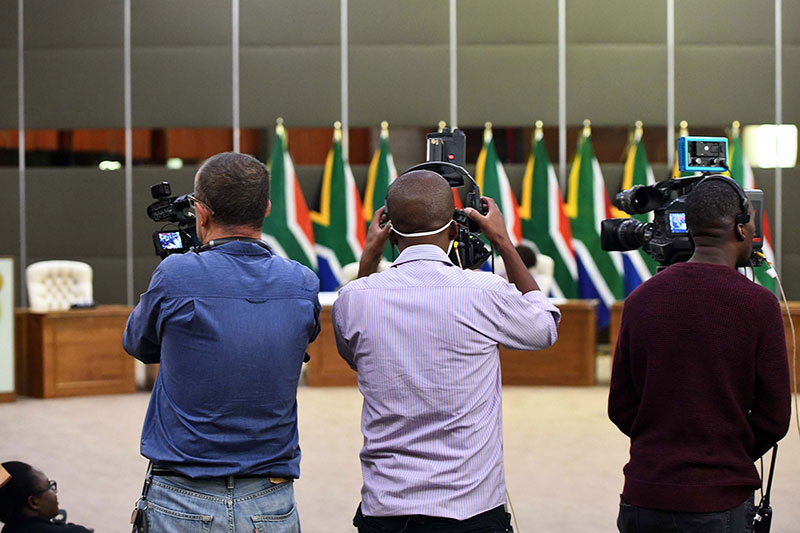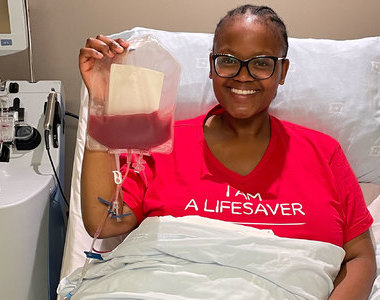‘Fake news’ and COVID-19: How have we performed?
23 April 2020 | Story Carla Bernardo. Photos Government Communication and Information System. Voice Nash Makado. Read time >10 min.
The fight against the spread of false information began long before the outbreak of the Coronavirus Disease 2019 (COVID-19) pandemic, and experts such as the University of Cape Town’s (UCT) Professor Herman Wasserman have been researching fake news for years now.
As fear grows around the pandemic, so too does misinformation – so much so that authorities such as the World Health Organization (WHO) and the United Nations Educational, Scientific and Cultural Organization (UNESCO) have warned that the spread of misinformation is putting lives at risk.
South Africa has certainly not been spared the struggle against the spread of false information. Since the first confirmed case of COVID-19 in the country, there have been numerous well-known instances: contaminated COVID-19 test kits, foreign nationals being forced to leave the country, chocolate Easter egg deliveries, and a minister announcing liquor trading hours during lockdown, to name just a few.
How have we, as a nation, responded to the spread of false information, and how have we protected the truth? Wasserman, director of UCT’s Centre for Film and Media Studies (CFMS), weighs in, giving his evaluation on how the media, government and the public have performed.
The media
Wasserman, who has written extensively on the impact of misinformation on the media, believes South Africa’s fourth estate has, generally, done a good job of informing the public about the state of the pandemic, government’s strategies to curb the spread and how the public can keep themselves safe.
The South African media, he said, has “mostly [trodden] a careful path” between collaborating with the government where justified – such as informing the public of lockdown measures – and monitoring government’s power through, for example, “asking critical questions about some of the lockdown regulations [and] abuses of power by the military”.

Although careful not to make conclusive statements about the nature of coverage yet – he is currently working with a team of researchers on a content analysis of media coverage, which will yield more concrete evidence – Wasserman has detected a shift in coverage as the impact of the virus has become more evident in the country.
“The very initial responses to the first confirmed cases of COVID-19 in the country were light-hearted – jokes, memes, humour – but as time went on, the tone became more serious,” said Wasserman. “At the moment we are seeing coverage focusing largely on lockdown regulations, abuses by the [South African National Defence Force] and police, and the economic impact of the lockdown.”
While some media resistance against the lockdown could be put down to contrarianism – “an almost knee-jerk reaction to criticise anything the government does” – legitimate questions about the abuse of power are also being asked.
The media have also frequently had to debunk common myths and misinformation; they did not always manage to escape the tentacles of misinformation. Some media couldn’t resist the temptation of engaging in speculation about possible therapies or anecdotal ‘evidence’. In at least one instance a news organisation erred by repeating false information – News24 repeated a false claim that Bill Gates was planning on testing a COVID-19 vaccine in Africa.
“But they acted swiftly to correct the facts, apologise for the error and [set] up systems to prevent future recurrences of similar lapses,” Wasserman said. “By acknowledging their mistake and being transparent about it, they made a laudable effort to re-establish the public’s trust.”
“They made a laudable effort to re-establish the public’s trust.”
This mistake, he said, illustrates the “immense pressure” the media is under when reporting on a rapidly changing and very complex situation, often with limited resources.
Reporting on the pandemic also requires a good grasp of scientific concepts and statistics, and, said Wasserman, many media outlets have had to acquire these skills on the fly. This, he said, is where experienced health reporters such as those at the health journalism platform Bhekisisa have really had a chance to shine, often drawing on knowledge that they developed during the HIV crisis in the early 2000s.
What also helps is having an authoritative figure like Professor Salim Abdool Karim, “who is an excellent science communicator”, at the helm of the government’s advisory committee.
“He has emerged as a strong voice from whom the media can get trustworthy and understandable information.”
Social media
Wasserman added that it is important to understand that the “contemporary media ecology encompasses much more than the mainstream journalism outlets”. A lot of information that’s shared and consumed is distributed on social media platforms such as Twitter and Facebook and on messaging platforms such as WhatsApp.
“This area is much murkier than the news media, and this space lends itself to the circulation of unverified information, speculation, rumour, false information, etc,” he said.
Because the ability to create, curate and spread information on these platforms is within the reach of all with access to them, Wasserman said that “we all have an ethical responsibility to scrutinise the information we receive, check its veracity and think very carefully before sharing [it]”.
Unfortunately, there has been wide circulation of rumours, false information and conspiracy theories, he said.
In a crisis like the COVID-19 pandemic, misinformation can be very dangerous – for instance when false claims are made about home remedies, cures or causes of the disease.
Government’s performance
When it comes to the South African government’s performance in terms of the spread of false information, Wasserman said the decision to criminalise misinformation under the State of Disaster regulations has been a controversial one: it tests the limits of free speech and can easily be abused.
“The regulation also seems overly broad and vague, and therefore difficult to implement fairly,” he added. “At the same time, the crackdown on fake news signals the seriousness of the threat of misinformation in the current context.”
But, to some extent, the government’s partnership with “experienced, independent NGOs” to help curb the spread of misinformation and remove fake news provides oversight and counterbalance.
“The crackdown on fake news signals the seriousness of the threat of misinformation in the current context.”
“I think before sending people to jail for spreading disinformation, it would be important to ensure that the news media is free to do their work, that the public is educated about the dangers of misinformation and know how to spot it, and especially that the public and community media be strengthened to play their important role of informing the public and providing platforms for discussion,” said Wasserman.
Public and community media have been seriously eroded in recent years due to corruption, lack of funding and mismanagement. This, said the CFMS director, adds to the imbalances and asymmetries in the media landscape, which often means that marginalised and poor communities do not have the same level of access to news agendas as wealthy elites. And this, he said, is a problem.
What we can learn
What can we all learn from our creation, distribution and consumption of information during the pandemic, and how do we do better?
When it comes to the media, Wasserman said their first instinct is to act as a watchdog over government – and rightly so. In the context of the pandemic, he said that instinct should lead the media to question government’s responses, policies, plans, etc.
It is correct for the media to insist on transparent data being made available, to ask government to justify its lockdown regulations and to shine a light on abuses of power by the police and military, for example.
“Collaboration in the public interest does not have to mean a sacrifice of editorial independence.”
“This does not mean the media automatically has to oppose everything the government does,” said Wasserman. “It is also appropriate, under conditions such as these, for the media to work with government to get important health and safety messages out to the public, and to support their efforts to curb the spread of the virus. Such collaboration in the public interest does not have to mean a sacrifice of editorial independence.”
He added that the media’s perspective is also important. There have been many reports on how the affluent keep themselves busy with baking banana bread and running marathons around their gardens, but there has not been as much attention paid to how the lockdown has affected the most vulnerable, such as the poor and homeless.
“When the media acts as a watchdog, it should do so on behalf of the public as a whole.”
Wasserman added that the public should also play its part in keeping the government accountable by demanding adequate access to, for example, data and planning to ensure that they receive trustworthy information.
“When the media acts as a watchdog, it should do so on behalf of the public as a whole.”
Finally, the CFMS director also has some tips and resources for the public so that everyone can combat the spread of false information. These include resources on how to fact-check information, such as Africa Check’s website, and arming oneself with skills, such as how to do reverse-image searches when in doubt.
“I think the most important rule for the public is to always be sceptical about the information they receive on social media and messaging platforms, to scrutinise it carefully, and to cross-check it with other, authoritative sources to check the message’s veracity,” said Wasserman.
“Don’t share if in doubt.”
 This work is licensed under a Creative Commons Attribution-NoDerivatives 4.0 International License.
This work is licensed under a Creative Commons Attribution-NoDerivatives 4.0 International License.
Please view the republishing articles page for more information.
Listen to the news
The stories in this selection include an audio recording for your listening convenience.























































































































































































































































































































































































